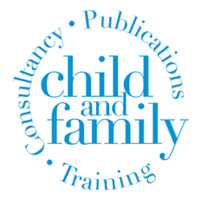Bookings no longer being taken. This is a 2-day session. The first was held on Thursday 29 April, those booking on after this day will still have access to this recording and of live session, and recording on the session on Thursday 6 May 2021.
Open Access Resources
Extracts HfCF Working with Families
Extracts HfCF Positive Parenting
Extracts HfCF Modifying Abusive & Neglectful Parenting
Extracts HfCF Emotional & Traumatic Responses
Extracts HfCF Disruptive Behaviour
Calgary guide to HfCF Intervention Resources
Modular multifocal interventions for CM
Hope for Children and Families
Therapeutic interventions to reduce the harmful effects of Adverse Childhood Experiences
This event is run in partnership with Child and Family Training UK (C and FT).
A seminar held over two afternoons on Thursday 29 April and Thursday 6 May 2021. Recordings of both sessions will be available to delegates for 28 days after the event. Please note these recordings are for the delegate only due to copyright and cannot be shared.
About the Topic
Adverse Childhood Experiences (ACEs) are defined as situations which lead to an elevated risk of children and young people experiencing damaging impacts on their health and other social outcomes across the life course. We are witnessing the impact of a significant ACE in the form of COVID-19 which has disrupted the daily lives of children and families around the world with immediate and likely long-term effects. Families are facing increased financial and environmental stress, job losses, food and security, difficulties in accessing healthcare and childcare, isolation, and fear related to personal and relationship safety experiences. Mandated lockdowns heighten risk factors in already vulnerable populations: the incidence of parental mental health, domestic violence, alcohol and substance abuse increases. Children and young people suffer increased levels of maltreatment and demonstrate heightened levels of negative mental health responses, anxiety, depressed mood and eating disorders, and challenging behaviours.
Fellitti et al. (1998) introduced the term Adverse Childhood Experiences (ACEs) in their study of factors relating to the health and well-being of an adult population. They categorised various forms of child maltreatment (physical, emotional and sexual abuse, and neglect) as ACEs. Their significant innovation was to add to these specific forms of maltreatment, ACEs associated with parental mental health issues, domestic violence and abuse, alcohol and substance abuse, parental incarceration, death and serious loss. The key findings of the research demonstrated there was a cumulative harmful effect, experiencing more than 4 of these 10 ACEs in childhood, resulting in significant physical, mental health and behavioural symptoms, associated with a shortening of the lifespan. An explosion of research has confirmed the harmful cumulative effect of ACEs on adult health (Hughes et al. 2017).
About the sessions
The seminars will explore the way the concept of Adverse Childhood Experiences (ACEs) has evolved, and the range of interventions proposed to meet the challenges posed by the associated complex processes that affect children and young people’s development and result in harmful long-term effects. This seminar will include the introduction of a modular approach developed by Child and Family Training (C and FT) as a possible evidence-based response. This is relevant for all practitioners working with children and families
There is universal recognition of the impact of the Covid-19 pandemic as a significant ACE in the lives of so many children and young people. There is also growing awareness of contextual factors such as parental mental health, domestic violence, poverty, deprivation and racism which amplify or protect against harmful life-span impacts. Research on the harmful effects of ACEs on children, young people and lifetime health over 20 years, has demonstrated an increasing range of ACEs, and their role and impact on children and young people presenting with concerns across services, including those related to mental and physical health, children’s social care, child protection, education/schools, youth offending and refugees. This seminar is targeted, therefore, at all practitioners across these services.
Session 1 (Thursday 29 April) will review the 20-year evolution since the introduction of ACEs, demonstrating their role in the lives of children and young people presenting across services. The neurobiological, stressful impact of ACEs on their development and functioning will be explored, and associated risk and protective factors that lead to a pathway of overlapping internalising and externalising responses, which in turn present as concerns to different services.
Session 2 (Thursday 6 May) will introduce proposed responses to modify the impact of ACEs, including a review of the strengths and limitations of evidenced-based approaches to address the harmful impact of maltreatment and trauma. A seven-stage model of assessment, analysis and intervention developed by Child and Family Training (C and FT) will be introduced. Through case material videos of complex cases, participants will be introduced to the Hope for Children and Families modular, multi-focal approach which can be adapted to accommodate the limitless complex presentations of children, young people and their families
Learning points
- A review of the evolution of ACEs from the original research that focused on childhood ACEs reported retrospectively by adults
- A review of research relating ACEs to poverty and discrimination
- Research on the impact of ACEs on children and young people’s lives
- Review of research on the relationship of ACEs to; Various forms of child maltreatment. Mental health problems of children and young people, including self-harming. Offending behaviour in children and young people, including sexually harmful behaviour, drug and alcohol abuse. Refugee children and young people. Domestic violence and intimate partner abuse, parental mental health, alcohol and drug abuse and their impact on children and young people.
- Neurobiological responses and the impact of toxic stress on attachment and emotional regulation; traumatic responses and the triggering of multiple mental responses in children and young people
- The development, value and limitations of ACEs questionnaires
- A review of research on effective intervention to address the harmful impact of maltreatment recommended by NICE, limitations of the interventions to address the overlapping, complex mental health responses associated with multiple maltreatment, and ACEs. The introduction of Trauma Informed models of intervention
- An introduction to the development of the Framework for the Assessment of Children in Need and their Families (Department of Health et al. 2000) as a solution to addressing complexity
- An introduction to the tools and approaches introduced by Child and Family Training (C and FT) to operationalise the Assessment Framework including the seven-stage assessment, analysis, planning and intervention framework illustrated by video case material
- Construction of a profile for intervention in the context of an assessment of parental capacity to modify ACEs, and the overlapping harmful impacts on children’s mental and physical health
- An introduction to the Hope for Children and Families Intervention Resources, their development and review of the effectiveness of modular approaches to treatment
- Demonstration of how modules in the resources can accommodate the limitless presentations of children, young people and their families to services
- A review of intervention guides focused on working with parents and the family: Addressing abusive and neglectful parenting, promoting children and young people’s health and well-being, establishing secure attachments, and promoting positive parenting and family communication
- A review of guides working directly with children and young people: Addressing emotional and traumatic responses, disruptive behaviour and the Impact of sexual abuse and sexually harmful behaviour
- Effective approaches to training.
Prices and booking
£95 – all levels of ACAMH Membership (approx $135, €110)
£135 – Non-Members (approx $189, €156)
Prices are for both days. Plus exclusive access to all lectures for up to 28 days.
To book simply click the button at the top of the page and fill in the details. ACAMH Members should sign in first to ensure that they get their discount.
If you are not an ACAMH Member now is a great time to join and make a saving on this event. Take a look at the different levels of membership on offer.
About the speakers

Arnon is a Child and Family Psychiatrist, and Director of Child and Family Training. He trained as a Psycho-Analyst and Family Therapist and worked at the Great Ormond Street Children’s Hospital and the Tavistock Clinic. He is a Visiting Professor at the Royal Holloway University of London. At Great Ormond Street he shared responsibility for Child Protection at the Hospital, and helped to initiate a number of services including the first Sexual Abuse Assessment and Treatment Service in the UK, and a Child Care Consultation Service. Research on Family Assessment formed the basis of the tools commissioned by the Department of Health to support the Assessment Framework. Child and Family Training was established to provide training and further developments

Dr. Samaa El Abd
Dr. EL ABD is an Egyptian British Child and Adolescent Consultant Psychiatrist. She has been
practicing medicine in the UK since 1985. Dr. El Abd is Fellow of the Royal College of Psychiatrists
in the UK. Dr. El Abd currently works at Keith Nicholl Medical Centre in Dubai and at the Cromwell Hospital in London. She had the position of Consultant Child and Adolescent Psychiatrist since 1998 in the UK, where she worked at St George’s Hospital London and at the Maudsley Hospital (South London and Maudsley NHS Trust. Dr El Abd has also worked at the University of Cairo and the University of Zurich.
At the South London and Maudsley NHS Foundation Trust, she had a particular responsibility for
the management and the running of a community service for neurodevelopmental disorders. She
has a special interest in the interaction between developmental and behavioral disorders and in
psychopharmacology. Dr. El Abd has particular interest in Parenting and was a consultant working in
the Intensive Parenting Project at the South London and Maudsley NHS Foundation Trust.
Dr. El Abd’s main emphasis is in empowering adults, maximizing the potential of children,
adolescents and their parents – in particular those with special needs. She obtained the degrees of
MSc (ped) and FRCPsych (London) and has completed her CCST (Certificate of Completion of
Specialist Training) in London.
Dr. El Abd has been leading in her role in developing psycho-education groups for parents and
teachers and running parenting workshops (empowering parents through implementing positive
behavior management strategies to get the best behavior from their children and to help treat their
behavior problems). Dr. El Abd combines her clinical/academic skills with day-to-day clinical work. She lectures both Nationally and Internationally at conferences and has published widely. Dr El Abd has been involved in the teaching and examination of medical students (Undergraduates and Post
Graduates), at King’s College London and St George’s Hospital Medical Schools (University of
London). Dr. El Abd has a passion for teaching and training professionals from multiple disciplines
and has been an undergraduate and postgraduate teacher, trainer and supervisor of junior doctors
and Msc students.
Dr. El Abd is a Director in Child and Family Training (C and FT) which is a not-for-profit organisation
that aims to help professionals help children and families by: promoting children’s and young
people’s health and development, building on children, young people and families’ strengths helping
children, young people and families overcome difficulties and using evidence-based approaches.
Four of the training guides of the C and FT have now been translated into the Arabic language, with
training being undertaken in Oman, Cairo, Dubai and Abu Dhabi.

Jenny Gray OBE
Jenny has been in children and families social work, management and policy development since 1979. Jenny joined the Social Services Inspectorate, Department of Health in 1991 and led the development of the new inspection methodologies. In 1995, she was appointed as the professional adviser to the British government on safeguarding children, firstly in the Department of Health and then in the Department for Education. Jenny held this post until September 2012. Jenny is now a social work consultant, working in both the UK and internationally. Jenny is a Child and Family Training Director and an Honorary Lecturer at UCL Great Ormond Street Institute of Child Health, London. Jenny, together with Dr Arnon Bentovim, edited the HfCF Intervention Guides for Practitioners. She delivers training both in the UK and internationally. In 2007, Jenny was awarded The Order of the British Empire and an Honorary Fellowship of the Royal College of Paediatrics and Child Health. She was President and CEO of the International Society for the Prevention of Child Abuse and Neglect from 2012 to 2014.

Stephen Pizzey
Stephen has been a practising social worker in the field of child care since 1976. He was a senior social worker specialising in working with adults and children with learning disabilities between 1981 and 1985. He became a team manager in 1985. In 1989, Stephen was appointed as Head of the Social Work Department at Great Ormond Street Hospital for Children and held this post until 1995. He was the Independent Chair of the Haringey Area Child Protection Committee (post-Climbie, 2001-2002). He also held a part time position as a lecturer in social work at Brunel University (2002-2004)
Now Stephen is an expert witness and undertakes a range of independent social work assessments for local authorities and reports in actions for damages against local authorities including cases of historical abuse. He has prepared Serious Case Reviews under Working Together to Safeguard Children; investigated complaints made against Local Authorities and voluntary agencies; and prepared child protection procedures for local authorities and Area Child Protection Committees. He is the chair of the Board of Directors of the Child and Family Training
Did you know
- ACEs are defined as situations which lead to an elevated risk of children and young people experiencing damaging impacts on their health, and other social outcomes across the life course
- COVID-19 is a significant ACE, disrupting the lives of children and families and increasing children’s levels of maltreatment and negative mental health
- Felliti et al. (1998) categorised ACEs as forms of child maltreatment, adding parental mental health, domestic violence, alcohol and substance abuse, incarceration, death and loss
- Experiencing more than 4 ACEs in childhood results in significant adult physical, mental health and behavioural problems, shortening the lifespan
- Turner et al. (2020) described an extensive set of 40 ACEs in childhood, adding exposure to natural disasters, pandemics, economic stress, community violence, racial, sexual victimisation, direct or online, physical assault and peer bullying
- The UCL Institute of Health Equity has observed higher rates of ACEs, and higher rates of adult physical and mental health problems and decreased life expectancy associated with poverty and deprivation – amplified during the Covid-19 Pandemic
- Systemic racism and every day discrimination are potent activators of stress responses and the risk of toxic stress. Racism is a significant adverse childhood experience
- Direct observations of children’s health and well-being reveal the neurobiological toxic traumatic stress basis for processes that affect them. Latent vulnerabilities, are responses that confer short-term functional advantages, compromising the capacity to negotiate normative contexts and future stressful events (McCrory and Viding, 2015)
- The challenge is to develop a prevention strategy to meet this enlarged set of ACEs and to reduce the harmful impact of ACEs when they are identified. A broad set of Trauma Informed Approaches have been proposed to meet complex needs, and widely adopted by ACEs hubs to foster collaboration across services. However, there is limited evidence of effectiveness of these approaches
- A possible solution when there are concerns about a child or young person’s health or development is the application and utilisation of a separate stream of development work parallel to that on ACEs
- The Framework for the Assessment of Children in Need and their Families (Department of Health et al. 2000) provides an eco-systemic template that constructs a holistic picture of the health and development of children, parenting capacity, family and environmental factors
- C&FT has developed tools that focus on the child and young person’s health and development, parenting capacity, individual and family health and functioning
- A seven-stage model of assessment, analysis, planning and intervention identifies ACEs, the harm sustained by children and young people, and the capacity of their parents to modify ACEs and collaborate with professionals during interventions
- The Hope for Children and Families Intervention Resources (HfCF) are modular and based on Common Practice Elements. Therapeutic procedures common across different orientations that are derived from single focal treatment manuals, integrated into HfCF guides and modules, and arranged around the Assessment Framework. They accommodate the limitless complex presentations of children, young people and their families.


